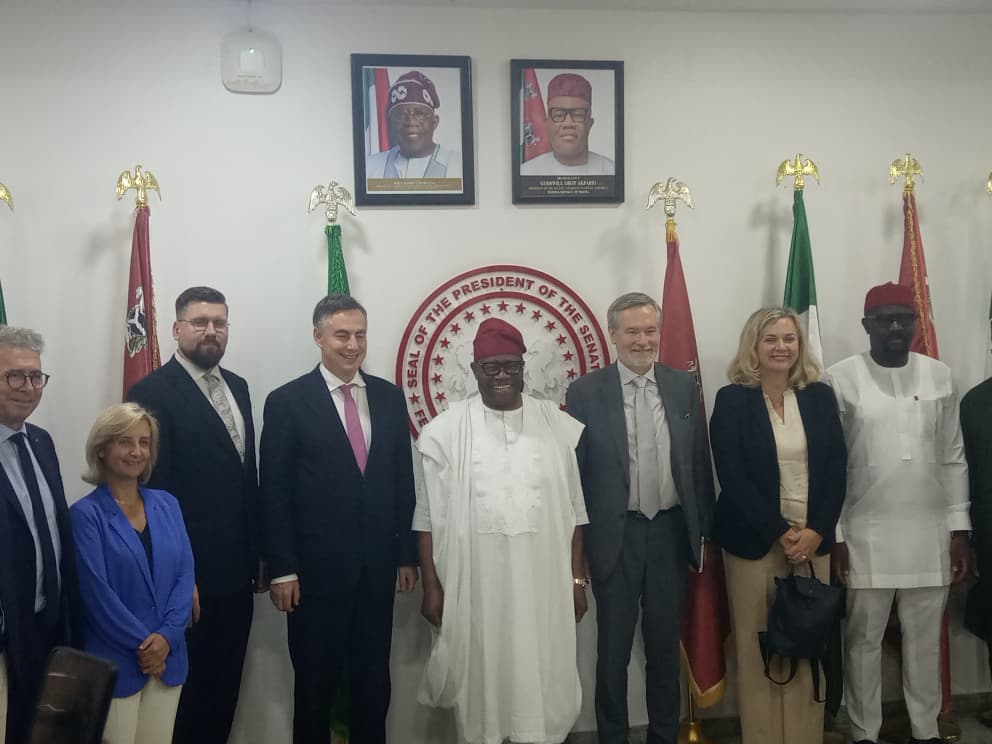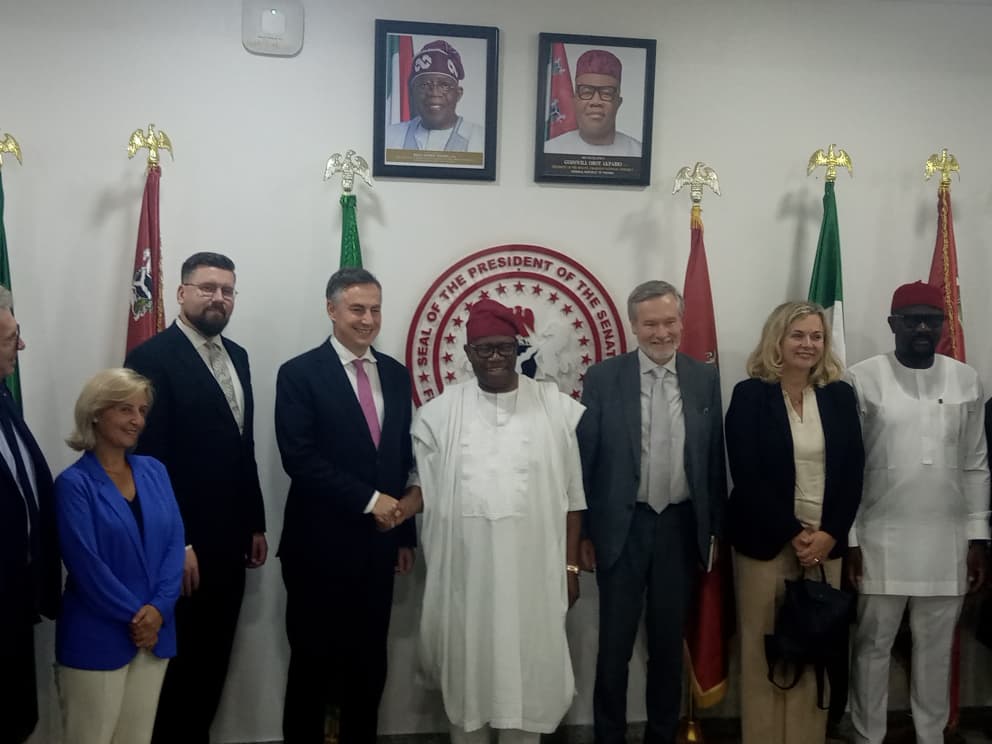Economy
FG begins 4th MSMEs survey – NBS

The Federal Government is set to begin the fourth round of the Micro, Small and Medium Scale Enterprises (MSMEs) survey.
The disclosure was made on Thursday in Abuja at a news conference jointly addressed by the office of the Statistician-General of the Federation and the Small and Medium Enterprises Development Agency of Nigeria (SMEDAN).
Mr Adeyemi Adeniran, Director, Real Sector and Household Statistics Department at the Nigerian Bureau of Statistics, represented Mr Yemi Kale, Statistician-General of the Federation, at the news conference.
Adeniran said that the survey would begin on Monday with a train-the-trainers workshop, while field work would start on Aug. 21.
He said that the survey which would be carried out in the 36 states and the FCT would cover 2019 and 2020.
He added that three surveys had been successfully carried out in 2010, 2013 and 2017.
Adeniran said that in the fourth round, the concept of Nano enterprises, a concept considered as micro enterprises, would be introduced.
`The new sub-division (Nano) refers to those enterprises that have only one or two persons engaged in their operations, while the micro enterprises are those enterprises with three to nine persons engaged in their operations.
“On this note, the survey will henceforth be called NMSMEs survey. In addition, a new module was introduced into the survey, which is the impact of COVID-19 on business operations.
“It seeks to identify how enterprises coped during the pandemic period and what areas of support and intervention they will require from government at this post-COVID lockdown period’’ he said.
On the objectives of the survey, Adeniran said that they would help to establish a credible and reliable database for the MSMEs.
He said that they would also contribute to job and wealth creation over a three-year period.
Adeniran added that they would help to assess the contributions of the MSMEs sub-sector to GDP and identify the number of NMSMEs owned on gender basis.
“The survey will also identify the skills gap in the sector; ascertain top priority areas that need government interventions and assistance and identify possible financing windows to raise low cost financing,’’ he said.
On the impact of past exercises, Adeniran said they allowed government to look inward into those sectors within the MSMEs that were making impact on the GDP to strengthen them.
He added that they looked at those that were not making much contribution to the GDP to bring them up to speed so that holistically, the improvement in all sectors within the MSMEs would lead to overall improvement in growth.
“We also know that the MSMEs sub-sector of our economy employs a huge number of persons; they engage a lot of workers in their daily activities.
“To this end, they are able to cushion the effects of unemployment that Nigeria is witnessing.
“If not for the MSMEs that are still serving the communities, the labour force population and the unemployment we have in the country will be more than what we are experiencing now,’’ Adeniran added.
In his remarks, the Mr Dikko Radda, Director-General, Small and Medium Enterprises Development Agency of Nigeria (SMEDAN) said that MSMEs were important to the sustainable growth of the economy.
He said the last survey indicated that the sub-sector contributed 49.78 per cent to the nation’s GDP.
According to him, they also accounted for more than 76 per cent of total employment and contributed 7.64 per cent to total export.
Radda said that the surveys gave SMEDAN the leverage to prepare programmes that would have impact on the sub-sector.
He said, however, that as important as the sub-sector was, it was still faced with challenges that impeded its start, growth and sustainability.
“One of the key challenges that have limited the development and growth in the sub-sector is the absence of up-to-date and usable data of MSMEs.
“Unfortunately, the inclusive, effective and sustainable development of the sub-sector is largely dependent on the availability of usable data.
“The exercise will necessitate visits to MSMEs across the country and we solicit the cooperation of all actors in the MSMES space as our enumerators will soon come to administer questionnaires,’’ Radda said.
Economy
JUST IN: FG Halts Planned 15% Import Duty on Petrol, Diesel

By: Fabian Apechihin
The Federal Government has suspended the planned implementation of a 15 percent import duty on petrol and diesel.
This was disclosed on Thursday by George Ene-Ita, Director of Public Affairs at the Nigerian Midstream and Downstream Petroleum Regulatory Authority (NMDPRA), who urged Nigerians to avoid panic buying.
President Bola Tinubu had earlier, on October 29, approved the imposition of the tariff following a proposal by the Executive Chairman of the Federal Inland Revenue Service (FIRS), Zacch Adedeji. The approval, conveyed in a letter signed by the President’s Private Secretary, Damilotun Aderemi, was intended to take effect from November 21, 2025.
The proposed policy sought to impose a 15 percent duty on the cost, insurance, and freight (CIF) value of imported petrol and diesel. It was aimed at supporting domestic refineries — such as the Dangote Refinery and modular plants — by making imported fuel less competitive. However, experts cautioned that the move could lead to an increase of up to ₦150 per litre in pump prices and further fuel inflation and transportation costs.
In its latest update, the NMDPRA confirmed that the import duty is no longer under consideration.
“It should also be noted that the implementation of the 15% ad-valorem import duty on imported Premium Motor Spirit (PMS) and Automotive Gas Oil (Diesel) is no longer in view,” the Authority stated.
The agency further assured the public of adequate fuel availability across the country, noting that national stock levels remain within the required sufficiency threshold.
“There is a robust domestic supply of petroleum products — including PMS, AGO, and LPG — from both local refineries and imports, ensuring timely replenishment of depots and retail stations,” the statement added.
NMDPRA cautioned marketers against hoarding, panic buying, or arbitrary price increases, emphasizing that it will continue to monitor the market to prevent any disruption in supply.
“While appreciating the efforts of stakeholders in maintaining smooth and uninterrupted supply, the public is assured of NMDPRA’s commitment to safeguarding national energy security,” the statement concluded.
Economy
FGN, Sign $400m Deal To Boost Local Steel Production

From Hassan Taiye
The Federal Government of Nigeria, FGN, through the Ministry of Steel Development, has signed a Joint Strategic Cooperation Declaration with Stellar Steel Company Limited.
Stellar Steel Company Limited is a steel-manufacturing enterprise established to operate in Nigeria, with major investment backing from Chinese parent groups: Galaxy Group and RSIN Group based in Fuzhou, Fujian Province, China.
The company has committed approximately US$450 million for a steel plant project in Ogun State, Nigeria, scheduled to begin operations by mid-2026.
This landmark partnership is aimed at revitalising Nigeria’s steel industry and reducing the nation’s dependence on imported steel products, according to a statement signed by the the Principal Information Officer, PIO, Ijomah Opia, for the director, Information and Public Relations in the ministry.
The agreement, signed in Abuja, on Tuesday 28th October, 2025 will see Stellar Steel invest $400 million in the construction of a modern Steel Plant in Ewekoro, Ogun State. The project will be developed in three phases, with the first phase expected to begin production by 2026.
The Minister of Steel Development Prince Shuaibu Abubakar Audu signed the agreement when he hosted Mr Li, President of Inner Galaxy Group and other members of the Stellar Steel Company Limited in the Ministry’s Headquarters in Abuja.
According to Prince Audu, the collaboration aligns with the federal government’s goal of achieving 10 million tonnes of crude steel production per annum by 2030, a major step toward industrial self-reliance and economic diversification.
The minister further stated that the Federal Ministry of Steel Development would facilitate policy and infrastructure support, including inclusion of Stellar Steel’s logistics projects in the National Infrastructure Plan and access to available fiscal incentives.
Highlights of the cooperation includes the followings:
1.Development of a localised iron ore supply chain to reduce import dependence and save over $1 billion in foreign exchange annually.
- Creation of more than 2,000 direct and 20,000 indirect jobs across the steel value chain.
- Promotion of green steel production using clean and energy-efficient technologies.
- Strengthening of Nigeria’s position as a regional steel manufacturing hub in West Africa.
Audi also said that in return, Stellar Steel would prioritise local recruitment and training, partnering with Nigerian universities to build technical and managerial expertise in steel production.
Prince Shuaibu emphasised that this strategic cooperation marks a new era for Nigeria’s steel industry and demonstrates the government’s commitment to sustainable industrial growth and economic transformation.
In his remarks the leader of the delegation, Mr Li assured the minister that Stellar Steel would respect all agreements reached and would ensure the completion of the project in record time and assured that all safety standards will be observed.
Mr Li was accompanied during the visit by Mr You Xiastian, Vice Chairman of RSIN Group, Mr Jackie Den, Vice President of Inner Galaxy Group and Mr Yin, Director of RSIN Group.
He recalled that the Minister of Steel Development, Prince Audu, performed the groundbreaking ceremony of the Steel Plant in Ogun State sometime in April, 2025.
Speaking at the signing, representatives of both parties emphasised that the partnership would strengthen Nigeria’s industrial base, create jobs, and foster technology transfer in the sector.
Economy
EU Delegation Strengthens Ties with Nigerian Senate

From Hassan Taiye
A high-level delegation from the European Union (EU) Parliament’s Foreign Affairs Committee, led by Mr. David McAllister, paid a courtesy visit to the Nigerian Senate today October 28, 2025.

“We are here to deepen our understanding of the situation in West Africa and strengthen our partnership with Nigeria,” McAllister said.
Senate President Godswill Akpabio welcomed the delegation, emphasizing Nigeria’s strategic partnership with the EU. “Nigeria is committed to strengthening ties with the EU, highlighting areas of mutual interest, including security, trade, and governance,” Akpabio said.
The delegation, comprising Ambassador Greta Mylott, EU Ambassador to Nigeria and ECOWAS, Miss Zelaya Zorko, Miss Mata Tamido, Sebastian Tankman, General Christophe Gomart, and Sebastian Buharo, is undertaking a comprehensive tour of West Africa, with stops in Nigeria and Ghana.
During the visit, Akpabio shed light on the challenges facing female representation in Nigeria’s parliament. “Women often vote for male candidates, making it difficult for female candidates to win elections,” he noted.
“The Senate is exploring innovative solutions, including constitutional amendments, to boost female participation in the legislative process, with support from organizations like the Black Women’s Forum.”
The EU delegation’s visit aims to foster greater understanding and cooperation between the EU and Nigeria, addressing shared concerns, such as terrorism, climate change, and economic development.
“The EU is committed to supporting Nigeria’s development efforts,” McAllister assured the Senate, emphasizing the bloc’s interest in seeing a stable, prosperous, and democratic Nigeria.
Their visit also includes participation in the forthcoming International Islamic Conference on Security and Governance in West Africa and the Sahel, scheduled for November 4-6, 2025 at ECOWAS Commission.
Akpabio expressed optimism about the potential for enhanced cooperation, highlighting Nigeria’s readiness to work with the EU to address common challenges.
-

 Uncategorized5 years ago
Uncategorized5 years agoFG, states urged to harness flooding for ranching, others with technology – Agbaje
-

 Headlines10 years ago
Headlines10 years agoBreaking: EFCC seals Borno House of Assembly, as Hon members take to their heels
-

 News11 years ago
News11 years agoNigeria Security Operatives Stage Manhunt For Homosexual Perpetrator
-

 News9 years ago
News9 years agoHow 21-year-old Girl fled community over accusation of lesbianism
-

 News10 years ago
News10 years agoYobe Gov Moves Against Deputy
-

 Opinion7 years ago
Opinion7 years ago7 signs she has friend zoned you
-
Technology4 years ago
Online job placement company headhunts women
-

 Headlines10 years ago
Headlines10 years agoBorno Dep Gov Abducts Another Church Leader





